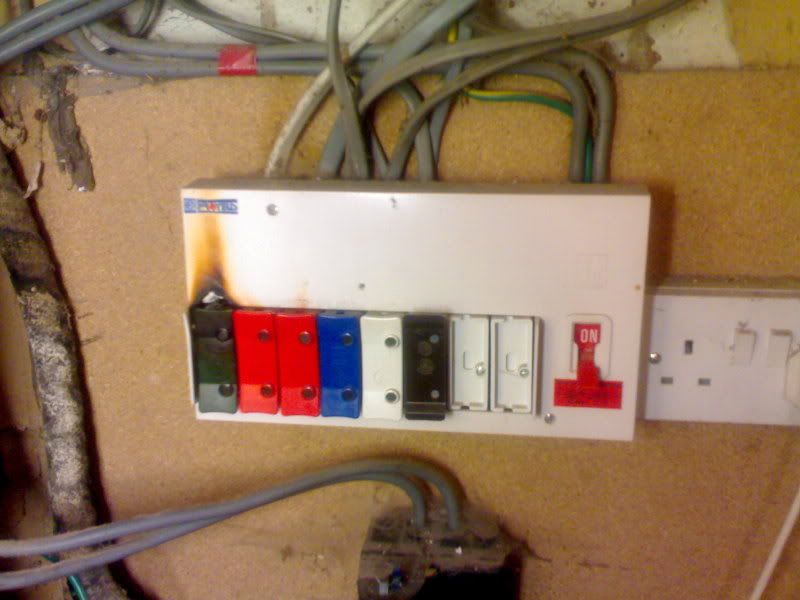Hi, I've just joined your excellent forum and I'm hoping someone can help me.
My boyfriend has an old-fashipned Wylex fusebox - the type where you have a series of little plug in cartridges (I think that's what they're called?).
This evening he was using an unusually large number of household appliances all at the same time - tumble dryer, washing machine, convector heater plus others, when he smelt burning.
On investigation, he discovered that the 30 amp fuse on the Wylex fuse box through which all the downstairs wall sockets are routed was extremely hot to touch and smelt burnt. However, the fuse had not blown.
He turned off all the appliances and the fuse returned to a normal temperature. He then turned off the electricity and inspected the cartridge, which he saw was melted around the top one of the two "prongs".
He now notices that when he uses the tumble dryer the fuse heats up quickly and becomes too hot to touch.
The fuse also heats up when several appliances are run off that circuit at the same time. However, the circuit still functions.
Clearly an electrician should be called in to inspect the fuse box. However, my boyfriend is concerned that the electrician will determine that the entire house requires rewiring. He's in rented accommodation and doesn't cherish the prospect of the house being rewired whilst he's in occupation - he won't really have a say in the matter as it's up to the letting agents what happens.
Is complete rewiring always a likely scenario with this type of problem? Is there some sort of requirement that it all has to be rewired under EU Regulations for instance?
Or is it possible / more likely that he simply needs a new modern fuse box with circuit breakers and the site of any actual fault in, perhaps, a small portion of the wiring sorting out in isolation?
He's lived there now for a couple of years and a further complication is that one of the sockets in the kitchen has never worked and the switch has locked in an intermediate position. I'm guessing that the two faults aren't connected.
Any advice at all would be appreciated?
Many thanks in advance!
Wendy
My boyfriend has an old-fashipned Wylex fusebox - the type where you have a series of little plug in cartridges (I think that's what they're called?).
This evening he was using an unusually large number of household appliances all at the same time - tumble dryer, washing machine, convector heater plus others, when he smelt burning.
On investigation, he discovered that the 30 amp fuse on the Wylex fuse box through which all the downstairs wall sockets are routed was extremely hot to touch and smelt burnt. However, the fuse had not blown.
He turned off all the appliances and the fuse returned to a normal temperature. He then turned off the electricity and inspected the cartridge, which he saw was melted around the top one of the two "prongs".
He now notices that when he uses the tumble dryer the fuse heats up quickly and becomes too hot to touch.
The fuse also heats up when several appliances are run off that circuit at the same time. However, the circuit still functions.
Clearly an electrician should be called in to inspect the fuse box. However, my boyfriend is concerned that the electrician will determine that the entire house requires rewiring. He's in rented accommodation and doesn't cherish the prospect of the house being rewired whilst he's in occupation - he won't really have a say in the matter as it's up to the letting agents what happens.
Is complete rewiring always a likely scenario with this type of problem? Is there some sort of requirement that it all has to be rewired under EU Regulations for instance?
Or is it possible / more likely that he simply needs a new modern fuse box with circuit breakers and the site of any actual fault in, perhaps, a small portion of the wiring sorting out in isolation?
He's lived there now for a couple of years and a further complication is that one of the sockets in the kitchen has never worked and the switch has locked in an intermediate position. I'm guessing that the two faults aren't connected.
Any advice at all would be appreciated?
Many thanks in advance!
Wendy


